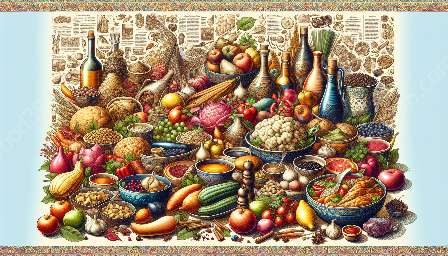Cooking is a fundamental aspect of human culture and civilization, and the tools and techniques used have evolved over time. As we delve into the ethical considerations surrounding cooking, we'll explore the evolution of cooking techniques and tools, as well as the origin and evolution of food culture.
Evolution of Cooking Techniques and Tools
The evolution of cooking techniques and tools can be traced back to the earliest human civilizations. From the discovery of fire to the invention of specialized cooking utensils, the way we prepare food has undergone significant changes over the centuries.
Discovery of Fire: The discovery of fire was a pivotal moment in human history, allowing early humans to cook food, which made it more digestible and safer to consume. This marked the beginning of cooking techniques.
Development of Cooking Utensils: As human societies advanced, so did their cooking techniques. The development of clay pots, grinding stones, and sharpened tools revolutionized the way food was prepared and cooked.
Industrial Revolution and Beyond: The industrial revolution brought about a wave of innovation in cooking technology. From gas stoves to electric ovens, the way we cook has continued to evolve, making the process more efficient and accessible.
Ethical Considerations in the Use of Cooking Techniques and Tools
As cooking techniques and tools have evolved, so too have the ethical considerations surrounding their use. Some of the key ethical considerations in the use of cooking techniques and tools include:
Resource Use:
One ethical consideration is the responsible use of resources. The energy and materials required for cooking, such as gas, electricity, and water, should be used efficiently and sustainably to minimize environmental impact.
Food Waste:
Cooking techniques and tools can influence the amount of food waste generated. Ethical cooking practices aim to minimize food waste through proper portioning, preservation, and use of leftover ingredients.
Animal Welfare:
For those who consume animal products, ethical considerations in cooking include the treatment of animals and sourcing of ingredients. This extends to the use of humane slaughter practices and ethical sourcing of meat, dairy, and eggs.
Health and Nutrition:
The health and nutritional implications of cooking techniques and tools are also important ethical considerations. Cooking methods that preserve the nutritional value of food and promote healthy eating align with ethical principles.
Cultural Respect:
Respecting cultural traditions and food practices is an essential ethical consideration in cooking. It involves understanding and honoring diverse food cultures while being mindful of cultural appropriation and misrepresentation.
Origin and Evolution of Food Culture
Food culture encompasses the customs, traditions, and practices surrounding food and eating within a particular society. It is shaped by historical, geographical, and social factors and has evolved over time.
Historical Influences: The origin of food culture can be linked to early human settlements and the development of agricultural practices. The cultivation of specific crops and domestication of animals influenced regional food cultures.
Globalization: With the advancement of trade and transportation, food cultures began to intermingle, leading to the exchange of culinary traditions and the emergence of fusion cuisine in different parts of the world.
Technology and Innovation: The evolution of cooking techniques and tools has significantly impacted food culture. Innovations in food processing, preservation, and cooking methods have diversified culinary traditions and expanded food choices.
Conclusion
The ethical considerations in the use of cooking techniques and tools are deeply intertwined with the evolution of cooking techniques and tools, as well as the origin and evolution of food culture. By understanding the historical context and societal influences, we can navigate these ethical considerations with mindfulness and respect for the environment, cultural diversity, and ethical principles.


